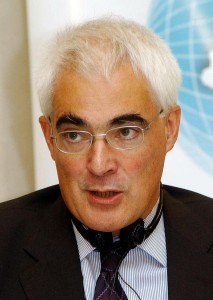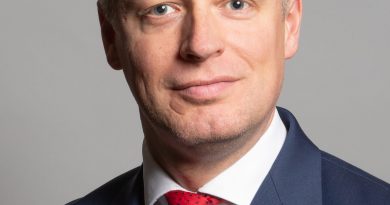Alistair Darling – 2002 Speech on the Railways
Below is the text of the speech made by Alistair Darling on 2nd July 2002 at the Railway Forum.
Introduction
‘Getting on with it’ is the title of this conference and that is exactly what I want to talk about today. It’s what your customers expect from you. And bluntly it’s what the public tell us too.
I’ve been impressed at how much enthusiasm there is to work together. And importantly an enthusiasm to get on with it. That’s in all our interests. Industry. Government. And most crucially the passengers.
Today is not for analysing how we got where we are. Rather we need to focus on how progress is made from now on. Towards a better and safer railway.
To allow plenty of time for questions, I shall be brief. In following weeks and months I’ll set out in more detail how I believe we should take things forward from here. And at the same time, I’ll address important wider issues such as the critical balance between road and rail and how we get that right.
You asked me to set out my first thoughts in relation to the railway. Today I’ve got three things I want to say:
First, we must to build from where we are
Second, you need to work together, and we with you.
And third, the industry must look at things through the eyes of its customers, the travelling public.
Focus on delivering existing strategy
I’m clear the first priority must be to deliver existing objectives. So let’s concentrate on making improvements where they are needed most. We need to convert the very substantial funding going into transport through the 10 Year Plan into visible results and improvements year on year.
The day I got this job I said I would take a good look at all the Department’s work. That’s what you would expect. But I also said that I had no intention of tearing up the 10-Year Plan and starting from scratch again.
Just as economic stability is essential for businesses to plan investment with confidence. So we need stable transport policies.
Of course we’ll improve on the plan. It will undoubtedly need further development. And we’ll do it. But the immediate need is to get on and see visible progress as quickly as possible.
The railways have been through a difficult time. The legacy of years of under investment are very apparent.
And all this alongside the public rightly demanding better standards means there is a lot to be done. And the public is rightly impatient for change.
Now there are successes. In my first few weeks I have been struck by what is being achieved:
4000 new carriages on order or delivered
A substantial increase in freight and passenger numbers over the last 5 years
And construction of the first new major railway for over 100 years ( the Channel Tunnel Rail Link) now on time and on budget
We need to build on these. A clear programme delivering improvements across the whole network.
Last week’s announcement which will lead to the setting up of Network Rail was crucial to get the network on to a sound footing. And I’m grateful for the welcome most of you gave it. It marks a new spirit of co-operation, working together.
Work together
Which brings me to my second point. ‘Getting on with it’ means working together. The fragmentation and lack of common purpose that characterised the railway system in the past few years has been damaging and destructive to the interests of both the industry and the travelling public.
As many of you recognise, the industry needs to work together. In the same direction with a shared objective. Sorting out the small problems as well as the bigger ones. And you’ll have our support.
And the Department will always be open to new ideas and approaches. Not just from industry but user groups and the wider public. If there’s a case for change or a new approach, let’s discuss it. But always remembering the key thing is to get on with the job in hand.
Progress is being made. I am encouraged the industry is now working together far more closely than in the past. In particular, I welcome the good relations between the Rail Regulator and the Strategic Rail Authority, Railtrack and the operating companies.
With the setting up of Network Rail, there’s been some comment about what this means for the relationship between Government and the industry. Of course it’s Government’s job to put the right structures in place and secure the funding we need. But let’s be clear about this: it’s your job to manage and to deliver.
The Strategic Rail Authority has already brought coherence to long-term planning. As well as a clear commitment to getting results. The new management is making a real difference
Network Rail will operate in the public interest. But it needs to driven by sound commercial decision-making. It must have a firm control over its costs, its assets and its contractors.
Through the 10 Year Plan, we are providing the funding to put right decades of under-investment. But we will not write blank cheques. You’ve got to show results.
The Train Operating Companies need to bring in the flair and efficiency they promised. And they can point to some successes – new rolling stock for example. But there are still problems to be overcome. Operating Companies account for half the network’s delays.
For the railways to work, everyone has to work together. I want to say a word about contractors and subcontrators in that context. This is a big issue. A problem we know needs to be sorted out.
Now there always have been subcontractors in the industry. That’s not the problem. Rather the problem is that in too many cases not enough attention is being paid to making sure subcontractors do what they are supposed to do.
And what is imperative for safety also makes good sense commercially.
So what’s needed urgently is end to end accountability. And it isn’t enough to put in place processes – ticking boxes to show the process has been followed. Checks are needed to see they’ve actually done what they are supposed to do. Safety is of paramount importance.
We’ll play our part. I am going to publish proposals for a new independent Rail Accident Investigation Branch later this month. Setting up for the first time in the railway’s history, an independent railway investigator whose sole focus is to establish the causes of accidents and to learn lessons.
Look outwards and improve
This brings me to my third and final point. The industry needs to look out at the railways through the eyes of its customers – both passengers and freight.
Customers are concerned about results. They want to see trains running on time. They are concerned about safety. And they want to travel in comfort. This is not rocket science. And it’s within our grasp. We just need to do it.
But there’s more to it than that. People should use the railway because they want to. Not because they have to. As an industry you should set high standards for yourselves. We need more innovation. We need to give the customer proper choice. Reflecting the way they want to travel. Easy to book tickets which are easily changed.
The railways have been about for a long time. But the industry needs the vigour and imagination of a new industry.
We can learn from the way newer industries have responded to the demands of their customers. You face different problems. So your solutions will be different. But be creative. Show some flair.
Stand in your customers’ shoes. Ask yourselves what matters to them. Services should centre around the customer. Not shoe-horn customers into operational convenience. Or because it’s always been done that way.
We must set our sights on a railway network that is consistently reliable and accessible to its passengers. It will take time. We’re making up for years of under investment. The approach is changing. There is the beginning of a new culture of co-operation which should deliver year by year improvement. Putting it bluntly, there’s a lot more to be done.
Conclusion
That’s all I want to say today. There will be more in months to come. But I said I would give you my first thoughts. We build on what’s been achieved. And work together. And we put ourselves in the passengers’ shoes . If we do that I believe we can make a real difference to the railways in this country.


